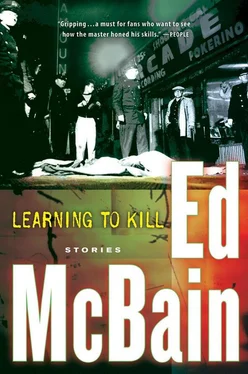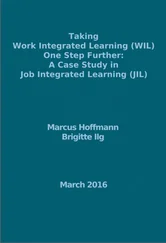Carruthers worked for the airline, but he was apparently well-satisfied with his job. Liked flying, he’d said. Besides, to hear him tell it, he’d never even considered killing his wife. Sort of killing the goose, you know. She was too valuable to him. She was — what had he alluded to? Insurance. Yes, insurance.
Which, in a way, was true.
Carruthers had no way of knowing how Ellison would react to his daughter’s death. He could just as easily have washed his hands of Carruthers, and a man couldn’t take a chance on—
“I’ll be goddamned!” Davis said aloud.
He glanced at his watch. It was too late now. He would have to wait until morning.
“I’ll be goddamned,” he said again.
It would be a long night.
Arthur Schlemmer was a balding man in his early fifties. A pair of rimless glasses perched on his nose, and his blue eyes were genial behind them.
“I can only speak for Aircraft Insurance Association of America, you understand,” he said. “Other companies may operate on a different basis, though I think it unlikely.”
“I understand,” Davis said.
“First, you wanted to know how much insurance can be obtained from our machines at the San Francisco airport.” Schlemmer paused. “We sell it at fifty cents for twenty-five thousand dollars’ worth. Costs you two quarters in the machine.”
“And what’s the maximum insurance for any one person?”
“Two hundred thousand,” Schlemmer said. “The premium is four dollars.”
“Is there anything in your policy that excludes a woman traveling on a company pass?” Davis asked.
“No,” Schlemmer said. “Our airline trip policy states ‘traveling on ticket or pass.’ No, this woman would not be excluded.”
“Suppose the plane’s accident occurred because of a bomb explosion aboard the plane while it was in flight? Would that invalidate a beneficiary’s claim?”
“I should hardly think so. Just a moment, I’ll read you the exclusions.” He dug into his desk drawer and came out with a policy that he placed on the desktop, leafing through it rapidly. “No,” he said. “The exclusions are disease, suicide, war, and, of course, we will not insure the pilot or any active member of the crew.”
“I see,” Davis said. “Can I get down to brass tacks now?”
“By all means, do,” Schlemmer said.
“How long does it take to pay?”
“Well, the claim must be filed within twenty days after the occurrence. Upon receipt of the claim, and within fifteen days, we must supply proof-of-loss forms to the claimant. As soon as these are completed and presented to us, we pay. We’ve paid within hours on some occasions. Sometimes it takes days, and sometimes weeks. It depends on how rapidly the claim is made, the proof of loss submitted, and all that. You understand.”
“Yes,” Davis said. He took a deep breath. “A DC-4 crashed near Seattle on January sixth. Was anyone on that plane insured with your company?”
Schlemmer smiled, and a knowing look crossed his face. “I had a suspicion you were driving at that, Mr. Davis. That was the reason for your ‘bomb’ question, wasn’t it?”
“Yes. Was anyone insured?”
“There was only one passenger,” Schlemmer said. “We would not, of course, insure the crew.”
“The passenger was Janet Carruthers,” Davis said. “Was she insured?”
“Yes.”
“For how much?”
Schlemmer paused. “Two hundred thousand dollars, Mr. Davis. The maximum.” He wiped his lips and said, “You know how it works, of course. You purchase your insurance from a machine at the airport. An envelope is supplied for the policy, and you mail this directly to your beneficiary or beneficiaries as the case may be, before you board the flight.”
“Yes, I’ve taken insurance,” Davis said.
“A simple matter,” Schlemmer assured him, “and well worth the investment. In this case, the beneficiaries have already received a check for two hundred thousand dollars.”
“They have?”
“Yes. The claim was made almost instantly, proof of loss filed, the entire works. We paid at once.”
“I see,” Davis said. “I wonder... could you tell me... you mentioned suicide in your excluding clause. Was there any thought about Mrs. Carruthers’s death being suicide?”
“We considered it,” Schlemmer said. “But quite frankly, it seemed a bit absurd. An accident like this one is hardly conceivable as suicide. I mean, a person would have to be seriously unbalanced to take a plane and its crew with her when she chose to kill herself. Mrs. Carruthers’s medical history showed no signs of mental instability. In fact, she was in amazingly good health all through her life. No, suicide was out. We paid.”
Davis nodded. “Can you tell me who the beneficiaries were?” he asked.
“Certainly,” Schlemmer said. “A Mr. and Mrs. Anthony Radner.”
He asked her to meet him in front of DiAngelo’s and they lingered on the wharf a while, watching the small boats before entering the restaurant. When they were seated, Anne Trimble asked, “Have you ever been here before?”
“I followed a delinquent husband as far as the door once,” Davis answered.
“Then it’s your first time.”
“Yes.”
“Mine, too.” She rounded her mouth in mock surprise. “Goodness, we’re sharing a first.”
“That calls for a drink,” he said.
She ordered a daiquiri, and he settled for scotch on the rocks. As he sipped at the drink, he wished he didn’t suspect her sister of complicity in murder.
They made small talk while they ate. Davis felt he’d known her for a long time, and that made his job even harder. When they were on their coffee, she said, “I’m a silly girl, I know. But not silly enough to believe this is strictly social.”
“I’m an honest man,” he said. “It isn’t.”
She laughed. “Well, what is it then?”
“I want to know more about your sister.”
“Alice? For heaven’s sake, why?” Her brow furrowed, and she said, “I really should be offended, you know. You take me out and then want to know more about my sister.”
“You’ve no cause for worry,” he said very softly. He was not even sure she heard him. She lifted her coffee cup. Her eyes were wide over the rim.
“Will you tell me about her?” he asked.
“Do you think she put the bomb on that plane?”
He was not prepared for the question. He blinked his eyes.
“Do you?” she repeated. “Remember, you’re an honest man.”
“Maybe she did,” he said.
Anne considered this, and then took another sip of coffee. “What’d you want to know?” she asked.
“I want to...”
“Understand, Mr. Davis...”
“Milt,” he corrected.
“All right. Understand that I don’t go along with you, not at all. Not knowing my sister. But I’ll answer any of your questions because that’s the only way you’ll see she had nothing to do with it.”
“That’s fair enough,” he said.
“All right, fire away.”
“First, what kind of a girl is she?”
“A simple girl. Shy, often awkward. Honest, Milt, very honest. Innocent. I think Tony Radner is the first man she ever kissed.”
“Do you come from a wealthy family, Anne?”
“No.”
“How does your sister feel about—”
“About not having a tremendous amount of money?” Anne shrugged. “All right, I suppose. We weren’t destitute, even after Dad died. We always got along very nicely, and I don’t think she ever yearned for anything. What are you driving at, Milt?”
“Would two hundred thousand dollars seem like a lot of money to Alice?”
“Yes,” Anne answered without hesitation. “Two hundred thousand would seem like a lot of money to anyone.”
Читать дальше












